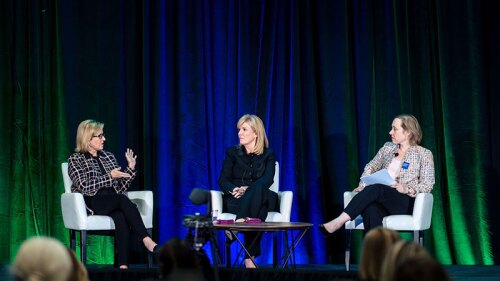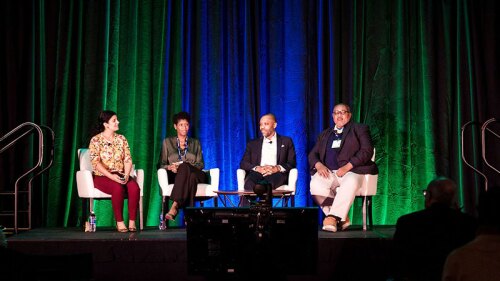Despite the deepest economic recession since the 1930s, small-scale entrepreneurs throughout the United States are finding creative ways to develop and finance both commercial and residential real estate projects—and occasionally even make money.
At a ULI 2011 Fall Meeting session titled “Small-Scale Development: Entrepreneurship in the Post–Credit Crunch World,” designer and developer Kevin Cavenaugh described his latest urban infill projects in Portland, Oregon, The Burnside Rocket. On a vacant lot next to a methadone clinic, he created a 16,500-square-foot (1,534-sq-m) mixed-use structure with an “edible” green roof. The rooftop garden supplies an adjacent restaurant that puts a new spin on “eating local” while offering views of the city. Geothermal heating and cooling helped the building earn the Leadership in Energy and Environmental Design (LEED) Platinum certification. Interestingly, this project has no designated parking at all. In fact, Cavanaugh received a $350,000 grant from the city because of the project’s support for public transit.
Construction was completed in 2007, with hard costs amounting to about $3.8 million, Cavanaugh said. In 2008, the building was valued at $3.9 million, but in 2011 it sold for just $2.9 million. Brushing off the million-dollar loss, he said: “I still have the brand, and I am moving on.”
Cavanaugh’s next project in Portland is on the site of an auto body shop lot, where he is developing “the Ocean,” another mixed-use endeavor that will combine a bakery, an office, and a loft with four “micro-restaurants” based on Portland’s popular food trucks. In the Ocean and his other projects, Cavanaugh likes to rent working space to “hypercreative” people who don’t want to work from their homes; “The myth of telecommuting is dead,” he stated. The Ocean’s development cost was approximately $1.3 million and it is currently valued at around $1.5 million.
While Cavanaugh has found higher and better uses for undeveloped and commercial urban land parcels, another West Coast developer—Mott Smith of Civic Enterprise Development, LLC—has discovered “gold” in the hills of Los Angeles, specifically in a group of nearly century-old “bungalows” that provided deteriorated but affordable rent-controlled housing within sight of the iconic Hollywood sign.
“Bungalow courts” are being demolished throughout the city, Smith pointed out, to make way for higher-density development. But for decades, these small detached or semidetached residences, typically measuring under 900 square feet (83.7 sq m), have served as affordable living spaces for Los Angeles workers. The homes originally were rented completely furnished, with lots of built-in and fold-down items including secretaries, beds, shelves, and even ironing boards.
Smith’s company discovered a 17-unit bungalow court that had been owned by the same family since the 1930s; its 700-square-foot (65-sq-m) rent-controlled homes were being rented for only $700 per month on average. Civic Enterprise paid $2.95 million for the hillside property, with 60 percent acquisition financing and one equity investor. They then set out on a plan to subdivide the property, restore the homes’ historic character, and sell renovated Maltman Bungalows at prices below those of comparable entry-level homes.
In carrying out their vision, Smith and his team faced a number of challenges including obtaining a new ordinance and entitlements, modernizing the utilities on a hillside location, and relocating tenants. The substandard garages had to be demolished in order to create freestanding homes.
The renovation was more than successful. The developer sold 16 of the 17 units in just three months during the 2007–2008 recession, with the last one selling just six months later. As a result, they preserved these unique residences for 17 first-time homebuyers, smoothed the regulatory path for future developers, demonstrated the market demand for very compact homes, and doubled their investors’ money. The lesson to be learned, said Smith, is that entrepreneurs are nimble and can create their own model with products unsuitable to large-scale developers.
“You must have a passion for what you’re doing,” added panel moderator Isaac H. Manning of Fort Worth, Texas–based Trinity Works. “If you don’t wake up at three in the morning sweating the details, and don’t love what you’re doing, then don’t do it.”



